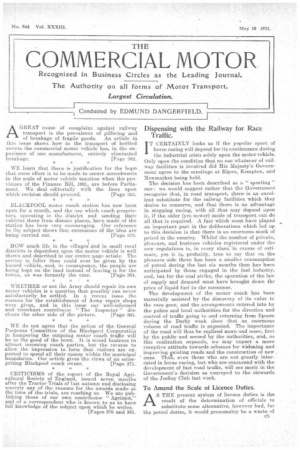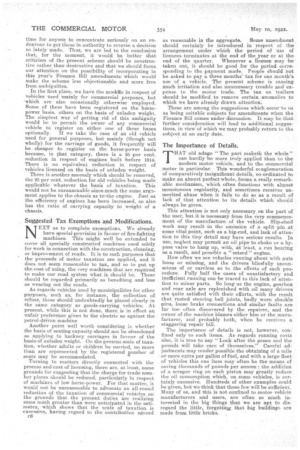Dispensing with the Railway for Race Traffic.
Page 1

Page 2

If you've noticed an error in this article please click here to report it so we can fix it.
IT CERTAINLY looks as if the popular sport of horse racing will depend for its continuance during the industrial crisis solely upon the motor vehicle. Only upon the condition that no use whatever of railway facilities is involved did His Majesty's Government agree to. the meetings at Ripon, Kenapton, and Newmarket being held.
The decision has been described as a " sporting " one: we would suggest. rather that the Government recognize that, in road transport, there is an excellent substitute for the railway facilities -which they desire to conserve, and that there is no advantage in stopping racing, with all that may depend upon it, if the older (yet newer) mode of transport can do all that is required. A fact which must have played an important part in the deliberations which led up to this decision is that there is an enormous at/3a of petrol in the country. Whilst the number of private, pleasure, and business vehicles registered under the new regulations is, in every class,—in excess of estimate, yet it is, probably, true to say that on the pleasure side there has been a smaller consumption of petrol during the last six months than has been anticipated by those engaged in thefuel industry, and, but for the coal strike, the operation of the law of supply and demand must have brought down the price of liquid fuel to the consumer.
The development of the motor coach has been materially assisted by the discovery of its value to the race goer, and the arrangements entered intoby the police and local authorities for the direction and control of traffic going to and returning from Epsom during the Derby week show that an enormous volume of road traffic is expected. The importance of the road will thus be realized more and more, first by the public and second by the authorities, and, as this realization expands, we may expect a more receptive attitude towards schemes for widening and improving ixisting roads and the construction of new ones. Thus; even those who are not greatly interested in horse racing, bat who are concerned with the development of fast road traffic, will see merit in the Government's decision as conveyed to the stewards of the Jockey Club last week,
To Amend the Scale of Licence Duties. To Amend the Scale of Licence Duties.
AS THE present system of licence duties is the result of the determination of officials to substitute some alternative, however bad, for the petrol duties, it would presumably be a waste of time for anyone to concentrate seriously on an endeavour to get those in authority to reverse a decision so lately made. Thus, we are led to the conclusion that, for the moment, it would be better that criticism of the present scheme should be constructive rather than destructive and that we should focus our attention on the possibility of incorporating in this year's Finance Bill amendments, which would make the scheme less objectionable and more free from ambiguities.
In the first place, we have the muddle in respect of vehicles used 'mainly for commercial purposes, but -which are also occasionally otherwise employed. Some of these have been registered on the horsepower basis, others on the basis of unladen weight. The simplest way of getting rid of this ambiguity would be •to permit the owner of any commercial vehicle to register on either one of these bases
optionally. If we take the case of an old vehicle used for general purposes but mainly (though not wholly) for the carriage of goods, it frequently will be . cheaper to register on the horse-power basis because, in that category, there is a 25 per cent. reduction in respect of engines built before 1914. There is no equivalent reduction in respect of vehicles licensed on the basis of unladen weight.
There is another anomaly which should be removed, the 23 per cent, reduction fox old vehicles being made applicable whatever the basis of taxation. This would not be unreasonable since much the same argument applies to the chassis as toethe engine. Just as the efficiency of engines has been increased, so also has the ratio of carrying capacity to weight of a chassis.
Suggested Tax Exemptions and Modifications.
NEXT as to complete exemptions. We already have special provision in favour of fire-fighting machines. This might well be extended to cover all specially constructed machines used solely for work in. connection with the construction, cleaning, or improvement of roads. It is to such purposes that the proceeds of motor taxation are applied, and it does not seem reasonable to tax, and so to put up the cost of using, the very machines that are required to make our road system what it, should be. These should be regarded primarily as benefiting and less as wearing out the roads.
As regards vehicles used by municipalities for other purposes, such as, for instance, the collection of refuse, these should undoubtedlybe placed clearly in the same category as goods-carrying vehicles: At present, while this is not done, there is in effect an unfair preference given to the electric as against the petrol-driven machine
Another point well worth considering is whether the basis of seating capacity should not be abandoned as applying to hackney carriages in favour of the basis of unladen weight. On the present scale of taxation, whether adults or children be carried, no more than are represented by the registered 'umber of seats may be accommodated.
Turning to matters directly connected with the process and 'cost of licensing, there are, at least, some grounds for suggesting that the charge for trade number plates should be reduced, particularly in respect of machines of low horse-power. For that matter, it would not be unreasonable to advocate an all-round reduction of the taxation of commercial vehicles on the grounds that the present duties are realizing sums much greater than were anticipated in the estimates, which shows that the scale of taxation is excessive, having regard to the contribution agreed 03'
as reasonable in the aggregate. Some amendment• should certainly be introduced in respect of the arrangement under which the period of use of licences terminates at the end of the year or at the end of the quarter. Whenever a licence may be. taken out, it should be good for the period corresponding to the payment made. People should not be asked to pay a three months' tax for one month's use of a vehicle. The present scheme is causing much irritation and also unnecessary trouble and expense to the motor trade. The tax on trailers should. be modified. to remove certain anomalies to which we have already drawn attention.
These are among the suggestions which occur to us as being suitable subjects for amendments when the Finance Bill comes under discussion. It may be that further consideration will lead to additional suggestions, in view of which we may probably return to the subject at an early date.
The Importance of Details.
THAT old adage "The part maketh the whole" can hardly be more truly applied than to the modern motor vehicle, and to the commercial motor in particular. This wonderful eenglomeration of comparatively insignificant details, co-ordinated to make an almost perfect whole, forms a really remarkable mechanism, which often functions with almost monotonous regularity, and sometimes receives unmerited abuse when it fails to do so as a result of lack of that attention to its details which should always be given.
This attention is not only necessary on the part of the user, but it is necessary from the very commencement of the manufacture of the vehicle. Slip-shod work may result in the omission of a split pin at some vital point, such as a, big-end, and lack of attention to this tiny detail may have serious results. In use, neglect may permit an oil pipe to choke or a bypass valve to hang up, with, at least, a run bearing as a result, and possibly a," seized" engine. How often we see vehicles running about with nuts loose or missing, and the drivers blissfully unconscious of or careless as to the effects of such pro, cedure. Fully half the cases of unsatisfactory and inefficient running can be traced to this lack of attention to minor parts. So long as the engine, gearbox and rear axle are replenished with oil many drivers are quite satisfied with their efforts, with the result that rusted steering ball joints, badly worn shackle pins, loose brake connections and similar faults are far too often discovered by the repairer, and the owner of the machine blames either him or the manufacturer, and probably both, when he receives a staggering repair bill.
The importance of details is not, however, confined only to such items. As regards running costs also, it is true to say "Look after the pence and the pounds will take care of themselves." Careful adjustments may render possible the obtaining of a mile
• or more extra per gallon of fuel, and with a large fleet of vehicles this one item may often be the means of saving thousands of pounds per annum the addition of a scraper ring on each piston may greatly reduce the oil consumption which, on some vehicles, is certainly excessive. Hundreds of other examples could be given, but we think that these few will be sufficient. Many of us, and this is not confined to motor vehicle manufacturers and users, are often so much interested in the big things that we are apt to disregard the little, forgetting that big buildings are made from little bricks.
































